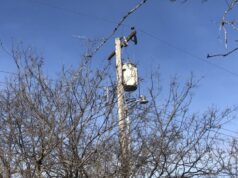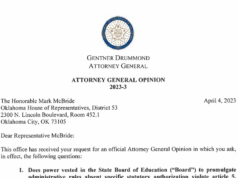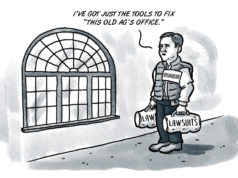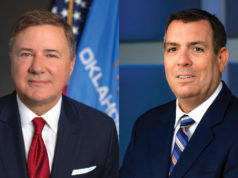
Politicians pander. It’s a necessary evil in their quest to obtain and maintain a position of relative power.
When the tenure of your job rests in the hands of a fickle and largely disinterested electorate, a certain amount of pandering is basically required when setting one’s foot into the political realm.
Enter Oklahoma Attorney General Scott Pruitt, a man who knows how to pander. For Halloween, he could dress up as a Pander Bear.
In the blood-red state of oil-drilling and Bible-thumping Oklahoma, AG Pruitt takes the talent to a new level:
- He’s filed lawsuits against the Affordable Care Act and recent immigration agendas from the Obama administration.
- He supports Bibles being distributed in public schools.
- He’s filed lawsuits against the Environmental Protection Agency for perceived overreach with regard to regulations on the coal, oil and natural gas industries.
- And one can always refer back to this New york Times article for excellent sourcing and fascinating insights into Pruitt’s political guile.
But regardless of how much people might disagree with the Danville, Ky., native’s political positions, they must admit his actions lay a strong foundation for a potential political empire. Our salt-of-the-earth types respect and support his opposition to Obama; the religious conservatives like his faith-based initiatives; and our corporate energy sector overlords champion Pruitt as a federalist leader sticking up for states’ rights when it comes time to protect their financial interests.
All of this is great for an eventual power grab at the height of Oklahoma’s political spheres, but an issue has emerged — one that I’m not sure fits into the AG’s master plan.
The ongoing saga of PUD 260
In 1987, the corporate federal income tax rate was reduced. At that time, the iconic corporation Southwestern Bell provided telecom services to a large swath of the Oklahoma population.
In 1989, the Oklahoma Corporation Commission (OCC) was set to vote on SWB’s public rates in light of the telecom giant’s recent federal tax reduction. Would those tax savings be passed on to customers, or would SWB be allowed to retain its newfound revenue?
The OCC voted 2 to 1 on public utilities docket 260 (PUD 260) to allow SWB to reinvest their extra revenue. Five years later, an FBI investigation revealed how then-OCC commissioner Robert Hopkins had accepted bribes from Southwestern Bell attorney William Anderson in exchange for his vote.
In 1994, both men were convicted on bribery charges and served time in federal prison.
Under the Oklahoma Constitution, bribed votes do not count toward a majority, so the OCC technically lacked the votes needed to decide the matter legally.
Fast forward to 2015
Now, a former campaign worker for the corporation commissioner who blew the whistle on Southwestern Bell’s bribery has been fighting to examine PUD 260 again.
Joined by a disparate cast of five others, former Nichols Hills mayor Sody Clements is fighting a battle that could conceivably reimburse Oklahomans with about $16 billion in funds misappropriated to SWB (now AT&T) for the past 25 years.
Currently Ward 1 councilwoman for Nichols Hills, Clements served on Bob Anthony’s campaign when he first ran for an Oklahoma Corporation Commission seat in 1988. Anthony took office in 1989, the same year as the PUD 260 vote, and eventually caught wind of the bribery scandal. He alerted the FBI.
Clements and retired Tinker Air Force Base commander Lt. Gen. Richard Burpee approached the Oklahoma Supreme Court in 2014 about reopening PUD 260, but seven of nine justices declined the review, while the other two justices did not participate in that judicial conference.
In addition to his military service, Richard Burpee was also former president of the Greater Oklahoma City Chamber of Commerce, as well as a sitting board member of Arvest Bank, Baptist Medical Center and several other entities.
After failing to get PUD 260 reopened in 2014, Clements and Burpee have since enlisted the help of energy mogul and philanthropist Ray Potts; horticulturist and volunteer Rodd A. Moesel; former OCC employee James Proctor; and Edmond Police Chief Bob Ricks.
Their united front has helped force a public hearing before the OCC on Tuesday.
It will mark the sixth time this issue will be brought up, either before the Oklahoma Supreme Court or in front of the OCC.
Ricks’ involvement may prove particularly interesting because he served as the director of OKC’s FBI office during the early ’90s bribery investigation.
Pruitt actively resisting PUD 260 inquiries
In an article posted Oct. 21 on OKEnergyToday.com, Clements spoke publicly about this latest challenge.
She was quoted as saying:
The technicalities have gotten in the way of truth and the truth is bribery is wrong. And we should have resolved this matter long ago. In any other court situation, it would have been tossed out immediately.
Why it’s been allowed to linger like this is anybody’s guess — I have some speculation.
The councilwoman declined to elaborate on that speculation when NonDoc contacted her earlier this week.
“I don’t believe I will comment further at this time,” she said by email. “Thanks for asking!”
But Clements’ speculation is likely the same as that presented, however tactfully, in a recent story from News 9, which is owned by Griffin Communications, which also owns OKEnergyToday.com.
Alex Cameron’s News 9 story led with the sentence, “Executives with telecommunications giant AT&T appear to have rewarded Oklahoma Attorney General Scott Pruitt for taking a legal position that has benefitted their company.”
The piece goes on to detail how, after the AG’s office sided with AT&T in dismissing the PUD 260 challenge in 2014, Pruitt’s campaign received donations from AT&T executives and other corporate officials.
According to files reviewed by NonDoc, his campaign received $43,500 from AT&T employees and interests between Aug. 12 and Oct. 20, 2014, which represented 44.5 percent of all donations for that period. News 9 and OK Energy Today’s analysis showed $41,000 in donations, but the different figures hardly matter.
Ironically, Pruitt ran unopposed in his 2014 re-election, and his gubernatorial and/or U.S. Senate aspirations are commonly discussed in political circles.
This isn’t the first time a powerful utility provider has risked the appearance of rewarding Pruitt for his actions.
In late 2013, OG&E hosted a fundraiser for Pruitt. About 45 employees donated funds, according to the New York Times. Four days later, the story notes Pruitt filed a new appeal in a case challenging the EPA, which had benefits for OG&E.
Now, Pruitt has again filed a motion opposing Clements’ most recent PUD 260 complaint.
Pruitt’s spokesman, Aaron Cooper, issued this statement to News 9 and referred NonDoc to it again Tuesday:
The Oklahoma Attorney General’s Office has maintained the position that the PUD 260 matter should not be reopened for nearly 20 years. As Attorney General Drew Edmondson stated to the Oklahoma Supreme Court in 1997, and again in 2010, “[t]he public interest would not be served by reopening an evidentiary hearing occurring nearly [two] decade[s] ago. The resources of the Commission and of the parties could be better utilized than by rehashing ‘ancient history.’ Accordingly, a rehearing of this cause is not in the best interests of [Southwestern Bell Telephone]’s customers and is not advocated by the Attorney General.”
How can Pruitt expect his position on PUD 260 to ring true with the public considering his lengthy and documented history of defending major corporate interests in Oklahoma?
For a politician so well-versed in the art of pandering — whose campaign website asks voters to “Help Scott protect the citizens of Oklahoma” — how does the potential reimbursement of an estimated $15,000 for every qualifying AT&T customer in the state not serve their “best interests?”
Whose best interest is really protected by refusing to re-examine a corrupt moment in Oklahoma’s political history?
The answer likely lies somewhere in the political realities of our time. When corporations are considered people, it’s corporate dollars that count, especially when most actual people can’t be bothered to get out and vote.
Regardless of anyone’s actual motivations, the entire PUD 260 situation certainly appears to be the worst form of political corruption.
It’s the kind done openly and without repercussion.





















